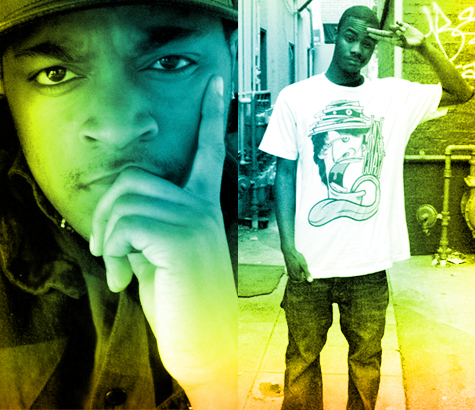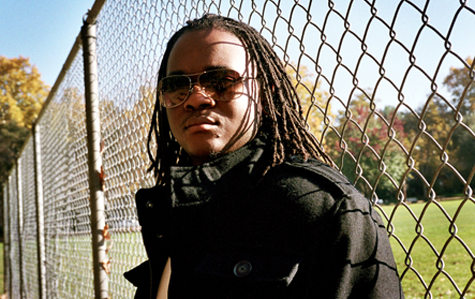Lee Bannon and Chuuwee look to make a mark among local hip-hop connoisseurs
With the recent death of legendary MC Guru of Gang Starr, nostalgia is running strong in hip-hop for the golden era sound. Gang Starr’s simplistic formula of Guru lending his commanding voice only to DJ Premier’s gritty boom bap production was a staple of an era that would be followed by meandering albums with a gang of producers tugging the sound in all directions.
So it goes, with every death there is a birth. Local rapper Chuuwee wasn’t born yesterday, but he was barely an infant when Gang Starr’s Step Into the Arena first hit the streets. Out to get a rep, Chuuwee is only 19, but his mind is old. Case in point: I never expected the first influence he mentioned to be Big L, another late great-just like I never expected Chuuwee to be underage when I inadvertently invited him to meet me at a pub. “Am I allowed in here?” he asked sheepishly, but I shrugged it off and guided the kid to the beer garden-he looks old enough.
On “6 Feet Deep,” a track Chuuwee played for me, he harks back to the Nas lyric, “I keep falling, but never falling 6 feet deep,” like he grew up on Illmatic. With the right influences in place, Chuuwee just needed his Premier, his Large Professor, hell, even his DJ Jazzy Jeff, to provide the proper backdrop to his voice. He found his complement in Lee Bannon, who is three years his elder. “There’s been duos throughout time and usually the producer is older,” Bannon said. “I look at it like we’re part of that tradition-the classic way of doing it.”
Bannon is neither a household name, nor a certified buzz name on the streets or blogs. Such credentials are inconsequential since it’s only a matter of time until the honors are added to his résumé. Bannon has lent his sound to Inspectah Deck of the Wu-Tang Clan, Talib Kweli, the Bay Area’s The Jacka and Los Angeles’ U-N-I. He has also produced numerous solo instrumental records. Like most producers, his sound can carry further than the name. Too often we appreciate the voice, but neglect to look to the maestro assisting the voice. As we continued to listen to music, Bannon would name drop producers like DJ Muggs and Madlib as styles he aimed to mimic.
Typically, when a producer does this, I nod politely, but consider the comparisons a stretch. But, as Bannon played beats to an upcoming project, it actually had DJ Muggs qualities, like an off-kilter bounce and the sharp chop of cacophonic samples.
The two met by chance at a local beat battle. Bannon took the initiative, reaching out to Chuuwee before the battle and giving him a beat to perform over. Initially, Chuuwee wanted a single beat from Bannon, but Bannon challenged the young pup to write a record. “I got a call from him unexpectedly,” Chuuwee said. “We started kicking it at a homegirl’s house and he got inspired by a pizza box. It all started falling into place from there.” Titled Hot ‘n’ Ready, the collaborative album has taken a wildly creative turn with a unique limited run in packaging. Forty pizza boxes filled with T-shirts designed by 12ftdwende, stickers and the CD will be available at urban boutiques like Havoc and United State, as well as other Midtown/downtown locations. “It will be a scavenger hunt-type thing,” he said. “If you seriously want the project in the collector’s box, you have to search for it. It’s a really cool idea. I ain’t never had nothing like that before, so I’m pretty excited about it.”
Bannon’s creative marketing strategy, matched with Chuuwee’s infatuation with concocting well thought out projects (a sensitivity sparked by his Obsessive Compulsive Disorder), make Hot ‘n’ Ready a unique project. The marketability of CDs is a dying art with the shift to digital formats. Bannon intends to intrigue new and old fans alike by presenting his music as a collector’s item before it’s even out of print and up for high-dollar auctions. “I’m trying to push the envelope with every project I go into concept-wise,” he said.
The pizza theme is not limited to the packaging, as Chuuwee said the concept loosely runs through the album, as evidenced by the closing track, “Last Slice.” “I wrote it in three-and-a-half weeks,” he said. “I don’t want it to seem like I rushed it. I’ve got extreme OCD, so my projects are always overly thought out. I only wrote it fast because [Bannon’s] beats were so inspiring. It just flows out.”
Chuuwee said he’s been stuck in the ‘90s since he started rapping. For the project, he requested that Bannon cater the beats to that style. “I’ve heard his first mixtape and it had a huge range,” Bannon said. “He did stuff over Neptunes, Dr. Dre and Common beats. It was a big spectrum of taste, so I knew I couldn’t make it all ‘90s boom bap, but a lot of it is that style.”
Bannon is more than a producer when it comes to conducting his business. A PR team is hardly necessary. His inspired approach with Chuuwee is just one of many projects with intricately thought out publicity plans. He is in talks of possibly having unplugged Chuuwee sets at local pizza parlors-although it’s a mystery as to how hip-hop can go unplugged. “What’s the biggest thing you’ve seen come out of Sacramento in the last five years?” Bannon asked, to which I could only reply Brother Lynch Hung. “It’s been a minute, and I think we can get into the masses like that. With his talent and my resources, I’m hoping to duplicate the past success I’ve had except through his words, instead of just my production.”
Happy Mayfield, Righteous Movement
Old Ironsides was a rocking boat April 18. Old friends were conversing and new friends were connecting, and for those who were rusty at socializing, the bar was there to hug. Lee Bob fans spoke fluently with leftover Bucho fans as Happy Mayfield heartthrobs conversed in familiar circles with Righteous Movement aficionados. It was clear that everyone in attendance had gathered for the same reason: to have a good time.
If there are two styles of music that are all about having a good time, they are hip-hop and funk. Historically speaking, one came from the other and so it seems so natural that they cross-pollinate. With that said, you need look no further for one hell of a good time than a bill that includes the aforementioned Righteous Movement and Happy Mayfield. If you are from Sacramento, then you’ve most likely seen Righteous but might not be familiar with Happy Mayfield yet. Happy Mayfield, a funk band to be reckoned with, is a harmonious marriage between singer/songwriter Lee Bob Watson and The Park (ex-members of local favorites Bucho). To my delight, I discovered upon viewing the stage that The Park was set up to play with Righteous as well. Hip-hop shows take on a whole new life when live instruments are part of the equation, and the boys in The Park were nice and warmed up after a stint at SXSW where they backed artists Alice Russell, Keelay and Zaire in the buzzing city of Austin, Texas a few weeks back.
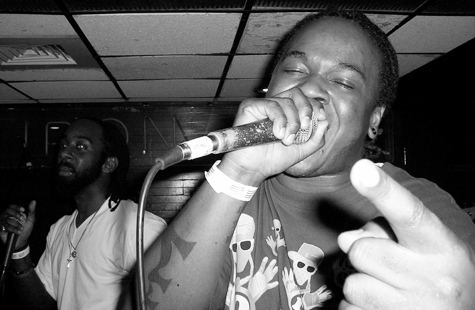
Righteous Movement’s set began with no introduction. Derek Taylor laid right in to the kit with Josh Lippi on bass, Ben Schwier on keys and Ross Grant on guitar following closely behind. Each backbeat groove was laid out with ease for the three (usually four) MCs to do what they do best: rap their asses off. The energy pouring from Old Ironsides’ small, dimly lit stage was almost overwhelming as the seven-player-deep ensemble blasted their way through a continuous set of funk-powered hip-hop tracks. Verses were traded back and forth, and each delivery had its own voice while still achieving that barbershop quartet harmony that Theek, Tais, Skurge and S.O.L. have carved out for themselves. The rhymes were well thought out, the hooks were fun and the gentlemen had a stage presence that exuded personality and experience. Righteous’ own DJ Tofu even made his way to the stage at one point, charismatically raising his poison of choice in a celebratory gesture. The audience, as thin as it had become at that point, needed no persuasion.
At the bar earlier that evening, The Park’s bassist Josh Lippi had told me that, “”¦Happy Mayfield is Lee Bob’s alter-ego.” We laughed and I didn’t think much of it until Lee Bob hopped up on stage wearing a pair of retro frames wrapped around his face, a faded T-shirt and a pair of bellbottoms to finish it off. Now don’t get confused, they weren’t all dressed up like a cheesy ’70s cover band. Happy just had a funky style, man.
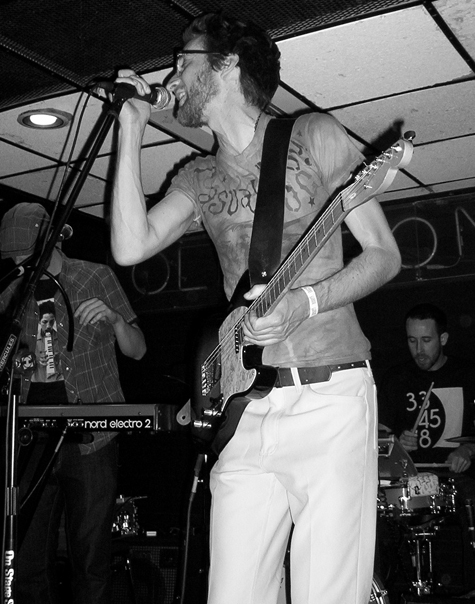
On stage, Lee Bob became this alter-ego. He was some sort of a shaman, writhing and whipping his head back and forth as if possessed by the spirit that he sought to conjure. The defining song of the evening found him screaming, “Happyyy!” at the top of his falsetto lungs—the band behind him pumping away, yelling more and fueling his hysteria. “You can’t get this at no corner store,” he cautioned his congregation. Taylor’s machine gun snare fills stuttered through Lee Bob’s mantra all the while Schwier’s keyboard cried and moaned to the crowd, which hung on every last note, their eyes ablaze and wishing strangely for the song to end but not knowing how; sadistically enjoying the agony. Lee Bob expelled his guitar, sprang onto the dance floor and erupted into an involuntary dance that then sent the rest of the movers and shakers into like positions. Local guitar guru Mike Farell, who had been looming in the audience, made his way to Lee Bob’s guitar and struck up a solo that built as the band swelled, and heavy-washed cymbals filled the spaces in between. Lippi’s solid bass playing anchored it all down. This was funk music in its most raw form.
I finished my Pabst and walked the four blocks back to my apartment feeling”¦happyyy.
A Writer Doing the Right Thing
The power of words can make you laugh or cry, act reckless or ignite thought and awake the mind. A writer for more than half of his life, Sacramento’s Tais has never taken his talents for granted. From prose to poetry, spoken word to performing as an MC, the 27-year-old has found a sanctuary in the art of arranging words and has turned his passion into his job. As another great MC with many parallels to Tais’s train of thought said, “It’s a beautiful struggle.” And that seems to be the approach with which the confident yet controlled MC is pursuing his dreams. He’s put in years as a member of Sacramento’s prestigious Righteous Movement, but recently stepped aside to release his debut Truth Arises in Search mixtape (which can bedownloaded for free at www.myspace/tais.com). Urb magazine just named him as one of their top 1,000 upcoming artists (vote for him on Urb.com!) and he’s infiltrating the country’s biggest music festivals in a matter of months. Big things are on the horizon for Tais, and when he gets there it will be on the strength of hard work and his inclination to do right with his words.
When did the power of music resonate with you?
It’s funny, because I get in these ruts and you need music to lift you up. There is one song that I was just listening to that always does it for me, and it’s Outkast’s “In Due Time.” Since I was young, music is always one of those things that I connected to. I grew up an Army brat, so I didn’t really have a lot of friends growing up. We were always moving, and as soon I as made a friend, we moved, but music was that person I could find comfort in. It understood me and I understood it. As I grew and started writing, I was able to communicate what I had going on in my head, because I didn’t have someone to bounce ideas off of.
When did you start to write?
I started to write poetry when I was 12 or 13, but started writing rhymes when I was 15.
What kind of a writer are you? Do you have a notebook of lines that you compile into songs?
Are you the type of person that needs the music to write?
I’m just a writer in general. I have my B.A. in journalism. It’s always been a passion of mine, and to me, is just a great form of communication. But rhymes come to me both ways, but I think for the most part it’s always a line here, stop and think about it and how I want to say it. For me though, if it comes easy, I discard it because I want to say the things no one says but everyone feels. If I think someone else could write a line, I shy away from those lines. So it does take me a long time, the thought process of writing, but sometimes you get the music and it just comes to you and you can spit out the whole song in 30 minutes.
This month you’re rocking three days out at the MAGIC Trade Show in Las Vegas, and then you’ve got the Truth Arises in Search mini-tour, which ends up in Sacramento on Feb. 26. In March you’re heading to Albuquerque, N.M. and then the SXSW Music Festival in Austin, Texas for a couple days at the end of the month. Needless to say, you are a busy man. Is this a surge to really get to that next level of recognition?
Oh yeah. That’s the plan. I’m trying to touch down in new places and get the message out. This is the longest time I’ve been in one city, so it’s kind of weird for me, but at the same time it’s time to branch out and get into the industry and make music a bigger part of my life. It does well for me now. I can go to Texas or Utah or Colorado and make it happen. It’s always a work in progress. When you go to these cities—sure you have Internet buzz or whatever—but when you go to these cities it’s human nature for people to think, “Why should I listen to you?” I’m building every day though.
I was going to say, when you go to all these different areas of the country where people haven’t heard of you, what’s that feeling like? To know that people are going to be pessimistic from the start?
I like the challenge. It forces me to not be lazy. Once you get into a spot where people accept you and you are comfortable, you kind of slack off. Me knowing that I have a show in San Francisco in a couple weeks where people haven’t heard of me, it’s making me prepare because I have to bring my A game. You know hip-hop, you got to show and prove. We have that ego about it. It’s good, though. It keeps me practicing all the time.
I think people sometimes look at rappers and the “rap life” and think it’s one big party, but as you said, it’s a lot of work. As mentioned you’re going to the festivals and conventions—how do you separate the fun and the work of it?
People that know me, they think I work too much. If you saw my daily schedule, you’d think I worked too hard. I have fun doing it, though. Working is what I love doing, and hip-hop is what I love doing, so it doesn’t seem like work when I look at it from the larger scheme. For me, I don’t drink at shows or smoke, just so I can keep that balance and that edge. In the end, I do have fun because I do what I love, even with all the struggles. It is hard work, though. It takes going to SXSW and putting in those hours.
On your Truth Arises in Search mixtape you talk about the other elements of hip-hop. Do you yourself get down with some of the others outside of MCing?
Man, I’ve been through all of them. I did them all! That is where I got my name from. I used to write Tais. I wasn’t the best graffiti artist in the world [laughs]. Nor was I the best breaker or DJ. I went through all the elements, and I think it was like finding my niche. I went through them all though.
So was rapping the last one you experimented with?
Rapping was the one I didn’t want to get pigeonholed into, but it kind of worked out that way. I was always writing, but you know I was breakdancing and all that too, trying to find out what my part was.
To wrap it up, what’s your ultimate goal one year from now? Two years from now?
I see myself on a bigger level, and what I mean by that is being successful and touring. I look at people like Murs and Little Brother, and they’re doing their thing, and I feel like I can do that too. I can see that happening, because it’s happening now. But on another level, I want people to be able to look at my rhymes and say I am a great writer. That is my ultimate goal, for people to respect my craft so much that it’s not, “He’s a dope rapper,” but rather, “He is a great writer.”
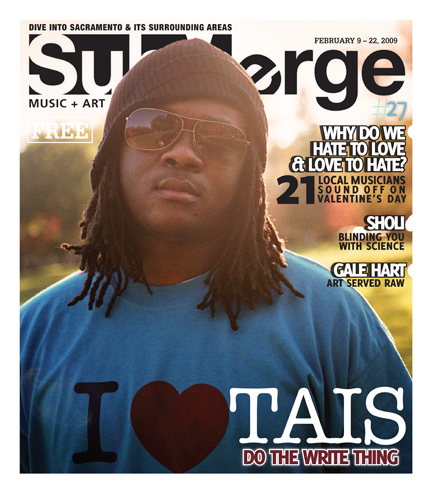
5th Avenue and Plush Lush
Long before I knew what it meant, I remember seeing stickers around town with the Neighborhood Watch logo draped in a dookie rope and adorned in Cazals. The logo stood out and commanded attention, and most importantly sparked curiosity and made you think. It is no coincidence that the hip-hop collective that the logo represents posses the same qualities. A crew of many, The Neighborhood Watch consists of several factions and solo artists alike, and as the crew’s founder 5th Avenue explains it, serves as a network of like-minded artists whose focus is to ignite thought through music. 5th Avenue, alongside Plush Lush make up one of branches of the crew, and under the name Rogue Scholars, they create feel good music with substance. The Sacramento natives are focused and intent on bringing a change to Sacramento hip-hop, and as 5th Avenue said in the closing of the interview, “We aren’t getting younger, but we are getting better.” And to be honest, it’s not difficult to feel comfortable and confident about the state of affairs with the Neighborhood Watch and the Rogue Scholars on the job.
Prior to meeting each other what were each of you doing musically?
5th Avenue: I always loved music; it’s in my blood. I got relatives who play, like my uncle plays sax in Mumbo Gumbo. Also I started writing poetry at a young age and also performing in theater. The performing background was there, and then just the passion for words sparked my interest in hip-hop. At the time we met, I was very new to it myself. I had been performing for a couple of months, but I was doing a lot of spoken word. I went through this transformation though to where I wasn’t really feeling the poetry thing, it doesn’t have as much freedom.
Plush Lush: I started out in a punk rock band when I was 14. The band was No Regard, we had lightweight success, but some members went on to form Tera Melos. I was doing that from 14 to 21, doing vocals and all that, but while I was doing that I was always into hip-hop and was writing rhymes on the side.
For each of you how does poetry and theater backgrounds come into play with your rhyming, and then Plush how does the punk rock background work itself into what you do?
5th: I hear from people I’m very animated and bring a lot of energy. That is just me being comfortable on stage, me being in my own zone. Being on stage has always been my release, and growing up I didn’t have many outlets but I always lets loose when I was on stage. That energy just transferred to music.
PL: It’s something I always try to keep with me. The punk rock ethic, just working really hard, doing things yourself, the DIY approach, that all molded me. By the time I started rhyming, I had already done 100 horrible shows where no one came. You have to endure that, and keep going and always give 100 percent regardless. One thing we try to do is always give a good show regardless. For him though, the between songs stuff, just talking to the crowd, the theater and poetry stuff comes out a lot then.
Can you talk about the formation of Neighborhood Watch and how it all came about?
5th: Cats look at me as a founder, and I hate to take that title, but I brought a lot of people together. By chance, all these people I had known all came together and just meshed really well. It was a big network that nobody realized was there until everyone sat down together. It was a culmination of things. I had a falling out with this one crew, and then I was developing some ideas of my own that I thought could progress hip-hop in town. That all catalyzed the Neighborhood Watch. I was living at this spot in south Sacramento and we would have a lot of sessions there, drinking cheap beer and just ciphering all day. Before we really tried to make music and throw shows we became friends. I think that’s what has kept us so strong. We’ve grown a lot since. Everyone is doing their own individual thing, but the Watch is still strong.
PL: It’s one of those things where the sum is greater than the parts. Definitely we’re a crew that is a lot of separate entities, but none of us use it as a crutch. We’re just always trying to expand and grow, and that just makes the crew stronger. I’ve heard people use that as a negative, like you got 100 people in the crew, you don’t do shows as a crew, or whatever, but the truth of it is we all grinding real hard separately and that just makes the name bigger.
You mentioned the different entities, can you talk about the Rogue Scholar name and what the two of you bring as a group?
PL: At this point we’re both college dropouts. College dropouts with the intent of going back, which is probably the worst type, but at least we work [laughs]. But I feel if you listen to our music, I feel like it has a lot of depth in terms of lyricism and we do things that maybe other people wouldn’t do. We don’t dumb it down; we smarten it up. We want to teach you but we are subversive about it. We question things, question the media and authority, and that’s where the rogue part comes in. You know we try to make it smart and intellectual, but also make it so that it could be understood by many.
5th: I think a part of the Rogue Scholar mantra is to get out the information that you don’t get taught in school or get in CNN or mainstream media. If you listen to his album, you’ll get a lot of stuff that a lot of people don’t want you to hear about. The aim is to really promote critical thinking and bring hip-hop to a place where you can debate it intellectually.
PL: I think we have a fresh subject matter. We talk about a lot of stuff the average political or conscious rapper might not talk about. I’m from Sri Lanka, which has been under decades of civil war and terrorism, and with my music I’m always trying to bring that out because it’s a story that’s not covered. With 5th, he’s constantly exploring things that aren’t the norm and being creative with it.
5th: That’s the thing. We try to come at it with different angles. We’re very sincere, like you’re not gonna get some fake shit with us.
You can download 5th Avenues’ mixtape The Coolest Hoods In The City Of Trees for free at www.myspace.com/theneighborhoodlum, and purchase Plush Lushs’ debut EP A Blind Mans Dream at Dimple Records.

